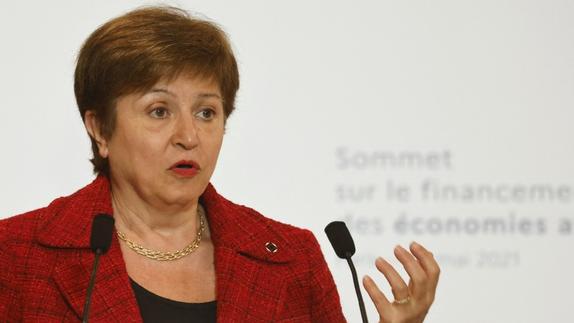 In this file photo, International Monetary Fund (IMF) Managing Director Kristalina Georgieva speaks during a joint press conference at the end of the Summit on the Financing of African Economies in Paris on May 18, 2021. (LUDOVIC MARIN / POOL / AFP)
In this file photo, International Monetary Fund (IMF) Managing Director Kristalina Georgieva speaks during a joint press conference at the end of the Summit on the Financing of African Economies in Paris on May 18, 2021. (LUDOVIC MARIN / POOL / AFP)
International Monetary Fund Managing Director Kristalina Georgieva expects the organization to pare back its expectations for the global economic rebound as the number of COVID-19 cases attributable to the new Omicron strain picks up.
“We are likely to see some downgrades of our October projections for global growth,” Georgieva said at conference hosted by Reuters Friday. New strains of the coronavirus “very rapidly can dent confidence,” she said.
The Washington-based IMF in October predicted that the global economy would expand 4.9 percent next year. For 2021, it had trimmed its outlook to 5.9 percent.
“2022 is going to be a very pressing year in terms of dealing with debt," thanks to a surge in borrowing during the pandemic, Georgieva said. While interest rates are currently relatively low, “that may not be the case through 2022,” said IMF managing director Kristalina Georgieva
Problems that pre-date the emergence of Omicron are now entrenching, including a deepening divergence between some countries recovering faster from the pandemic and others falling behind, Georgieva said.
In the meantime, “new problems are stepping forward for policy makers — in particular, inflation,” she said.
Debt concerns
Georgieva reiterated concerns she raised Thursday about low-income countries’ ability to repay debt, noting that about 60 percent of the world’s poorest nations are at high risk or are already in debt distress.
“2022 is going to be a very pressing year in terms of dealing with debt,” thanks to a surge in borrowing during the pandemic, Georgieva said. While interest rates are currently relatively low, “that may not be the case through 2022,” she said.
ALSO READ: IMF: Global recovery gap widens on unequal vaccine access
The Group of 20 in May last year started a debt-service suspension initiative to provide relief for the world’s poorest nations amid the pandemic. With the DSSI expiring at the end of this year and interest rates poised to rise, Georgieva said countries need to consider alternatives such as the so-called common framework, a plan modeled on the rules of the Paris Club of creditors to reorganize loans.
The common framework — meant to help countries deal with their unsustainable debt after the pandemic hurt their finances — has been plagued by delays and a lack of interest from debtor countries since its inception in November 2020. Only three countries — Ethiopia, Chad and Zambia — have asked for it.
READ MORE: IMF cuts 2021 global economic growth forecast to 5.9%
The IMF has tried to address disincentives for joining the common framework by proposing a stand-still on debt servicing the moment the framework is requested. Georgieva said she has engaged with private-sector lenders about this.
“My message to everybody is don’t wait until it is too late — it will be costlier for you,” Georgieva said. “It will be very painful for the countries. Move!”


